Ellen and Jim Have a Blog, Too
We are two part-time academics. Ellen teaches in the English department and Jim in the IT program at George Mason University.


_Pallisers 7:14_: Another transition: rejection, 2 transcripts (1) · 1 September 08
I have discovered that Pallisers 7:13 is the only part to be devoted to The Eustace Diamonds, for in 7:14 we again have as much material from Phineas Redux as in 6:12 we have as much material from Phineas Finn (invented and sourced).
To summarize, the movement into the Lizzie matter was slow and began in 5:10 when we have a pointed introduction to Lord Fawn (Derek Jacobi) and was resumed at the close of 6:11, when we meet Lizzie (Sarah Badel) in the carriage with Fawn and see her introduced to the Duke (Roland Culver, who will maintain a large presence in her story as a salacious foolish man titillated by stories of her [to him] glamorous wickedness). In 6:12 we very slowly transition away from Phineas Finn as out of 24 scenes 8 are Pallisers, and 6 Phineas, and 9 are Lizzie matter. 7:13 is all Lizzie matter but for one scene of Phineas (Donal McCann) and Mary’s (Maire Ni Ghrainne) marriage under strain.
7:14 is a transition which moves in the reverse direction. We still have a majority of Lizzie matter scenes, but the other stories, Phineas and Palliser matter catching up (so to speak): out of 16 scenes, we have 8 of Lizzie matter, 4 about Phineas (though 2 take place in Matching and are talk about him as was done in 3:6, the opening phase of interlacing Phineas Finn into Can You Forgive Her?); 3 combine the story of the Pallisers with Phineas and Madame Max (as they are combined in Trollope’s books and Raven’s Phineas Finn parts), and 1 is sheer Palliser: This one (scene 8) picks up the origination of the film series in a pair of incompatible people coerced into marriage, and anticipates strains in Prime Minister and Duke’s Children (in both Trollope and Raven), over political life, how to live it and how to interact with one’s children.
Altogether in 7:14, then, the 8 of Phineas and Palliser is an equivalent time and weight with the 8 of Lizzie matter, the last leading to closure for Lizzie, while the first 8 open the story and begin all Phineas Redux, important themes and characters1.
Raven’s solution for the incompatibility of the matter in tone and feel of the Phineas books and Lizzie Eustace’s story is to provide compelling dramatic scenes, many invented which lead us to make different parallels and configurations among the characters than those intended by Trollope. This part is just replete with theatrically-conceived: emotions are prominent but given strong expression though the characters rejecting or accosting one another.
I have taken down the script for 6 of the emotional ones between personally-connected people (in one case, Lord Fawn’s, someone trying to become personally connected) and transcribe 2 here. Both dramatize primal confrontations between two characters.
First two from Episode 26: Rejection. Lizzie is rejected by Frank (Martin Jarvis); Fawn is rejected by Madame Max (Barbara Murray) whose comic insistence Fawn’s place is by Lady Eustace’s side until her guilt is proved anticipates the serious plot where she stands by (if not visibly) Phineas in his trial.
In Episode 26, the 3rd and immediately preceding almost wordless deeply moving scene of Mary’s death after giving birth to a stillborn baby is another closing door of a relationship. The end scene of 7:13 was a quick triumphant rejection of Lizzie by Fawn after he hears Sergeant Bunfit’s words. So endings are in the air from the previous part and a previous short scene.
FIRST TRANSCRIPT
As the stills reveal, this scene is a study of Frank, not Lizzie:
Scene 4: Hartfield street, front room (Mrs Carbuncle’s rented house)
Frank’s final repudiation of Lizzie is a substitute or replacement for Trollope’s ED, Ch 71 (1972 new Penguin library, pp. 683ff). In previous cases Trollope had been more idealistic, more open-ended (as often is), and Raven sharper more cynical. So too here. In the case of Chiltern’s proposal to Violet, Trollope presents Chiltern as turning chivalrous, gentlemanly, moral; Raven (6:11) makes Chiltern (John Hallam) macho and impose himself once again, this time successfully sexually on Violet (Mel Martin). For Phineas and Mary Trollope had Phineas telling Mary about his problems and ending up in a high-minded engagement, while Raven shows them having sex twice out on the landscape, once on Christmas Eve (5:9, 5:10, 6:11), and then directly afterwards her maneuvring him to engage himself to her (just before they are about to have sex or have had it and are laying on the bed fully clothed (nowadays they would not be, 6:11).
So in Trollope again the breakup takes more time and Frank’s behavior still ambivalent: Towards the end of the book Lizzie once again pleads with Frank to marry her (Ch 65, pp. 627) after which Lizzie goes to Lucy and lies to her to say Frank has given Lucy up. At her Frank just punts; becoming irritated but he does not break with Lizzie (Ch 71, pp. 683), and comes with her to Scotland as an escort, and though he leaves the next morning (deeply alienated). Again in London he helps her in court. By contrast, Raven has Frank’s gorge rise at Lizzie’s lies, hollowness, nastiness about Lucy and sexual promiscuity, her complete untrustworthiness, and we see him part with her permanently:
1. Establishment shot: Lizzie laying on couch, with Frank standing there lecturing—as we saw them in 6:12, Episode 18 for the first time.
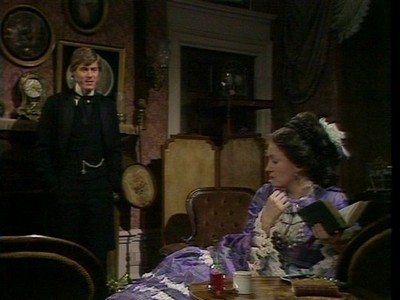
Frank (Martin Jarvis) talking at Lizzie (Sarah Badel) (Pallisers) (BBC 1974)
2. Dialogue.
Frank: “I want you to be very clear, Lizzie (harsh tone, puts down sheaf of official documents) now that you maid Crabstick has volunteered to assist the police, they’ll very soon know everything they want to.”
Lizzie: (eating candy, reading her book of poetry). “I s’ppose so.” (Great nonchalance).
Frank: “So it’ll go very hard with anyone who has at any time misled them.”
Lizzie: (posing supercilious look). “Why are you telling me this?” (little shrug)
Frank. “In case you have not always been strictly accurate.”
Lizzie: “I’ve been as accurate as I know how.”
Frank. “I hope so because if anything Patience Crabstick reveals is at variance with anything that you have desposed on oath, Lizzie, remember, then you are going ot be in very sorry trouble.”
Lizzie: “Not if I’ve got somebody to protect me, and that’s what you should be doing, Frank (we are back to square one, just what she required in the first scene we saw them together, a game) not standing there being hateful but protecting me.”
Frank: (angry and clipped accent, for he knows what a liar she’s been now): “I am doing my best …”
Lizzie: “You’ve been hectoring me and lecturing, that is what you’re doing. Is that all I am to expect from you after what passed between us?” (reference to them sinking into the bed together in the sickroom scene).
Frank looks sick. She’s blackmailing him for the sheer sex but not for respect and marriage quite in the way of Mary Floyd Jones. Lizzie wants payment in kind, game of appetites, and would buy him if she could, but then dump on him everything.
Lizzie: “Only the other day in this very house.
Frank (holding up his hands): “Lizzie you know I never meant …”
Lizzie (smiling) “Yes I know but you did [hav sex with me], didn’t you? Oh, marry me! You don’t love that Lucy and I do not love Lord Fawn. I’ve got a great deal to offer you, money and other things. I have a grear deal to offer all round Frank (wonderful shot of his appalled expression:
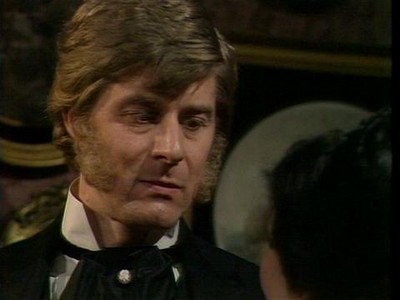
Frank alienated
Frank: Hmmm. And that is just how you offer it (a sexual disgust) ... all round. I love Lucy Morris (gentle tone) Lucy ain’t a patch to look at on you, Lizzie, but she’s as honest as the day and every single inch of her is mine.” (how men in love are said to feel).
Lizzie: “She aint’ got any inches, not where it counts (sneers and makes a face). Oh she’s so prim. Ewe.” (makes a pinched face and hand gesture).
Frank: “She’s not prim” (in the novel early on we read and discussed that paragraph where the narrator hinted Lucy and Frank had had a certain amount of sex or intimate physical contact if not full sexual intercourse).
Lizzie: “She is. Or why should you mind my saying so (triumphant sneer, turns round, laughs). Hmmmn if that is what you like. I’m not prim but then I don’t pretend to be anything I’m not.” (she holds up her hands all round his neck and begins to pull him to her. He stays them, holds them back, and looks at her fiercely and with distaste).
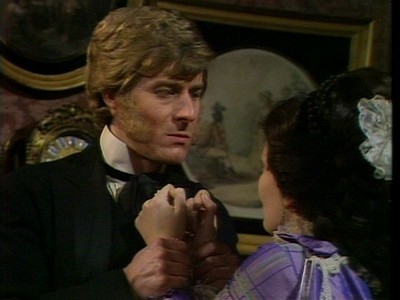
Frank showing fierce distaste as Lizzie attempts to bring him to her
Frank: (quiet) “No good Lizzie” (pinched face and begins to walk off, gets his things).
Lizzie. All right. All right. You go to your love sick governess and welcome to her every faithful grisley inch. And do not come back here when you’re tired of her.
Frank opens door and look at her. .”Poor Lizzie.” (Those who’ve read ED may remember the Duke’s closing line about how she’s in for a bad time)
She throws her book at him.
He closes the door and that is the end of that one. We hear the door below slam firmly. She faces forward.
*******************************
SECOND TRANSCRIPT
By contrast to the above, scene a study of the close-ups and framing middle range shots show the camera interested equally in both characters
Scene 6: Madame Max’s boudoir-apartment
[This scene does not follow immediately upon Frank exiting the door from Hartfield Street, never to return. First we have a short one of wholly original invention; again Penelope Rich glittering as Clara Hittaway accosts her brother; she steals upon Derek Jacobi as Lord Fawn writing a letter. Could this be
an allusion to the truthful letter Lord Fawn writes to Lizzie in the book (Ch 67, p 647-48), and this interruption could account for it never getting to Lizzie?]
1. Establishment shot: Madame Max is another of these heroines in these mini-series who seems to spend her off-stage existence tending to flowers. Large watering can in hand (it becomes a weapon), we see gorgeous yellow flowers in the front and the back of the room she has been caring for, and then the camera turns to Fawn looking eager and precipitate.
2. Dialogue.
Madame Max. (her words show us we are in medias res): “how did you know I was back in London, my lord?
Fawn. “I have been watching and waiting for your return.” (Eager voice)
Madame Max. “Yes, well, this is hardly a return. I am here merely to interview a man from Vienna [all these references to Vienna keep befoe viewers’ minds her connections there and may it not improbable she could find a house where Mr Emilius lodged and insinuate herself into the confidence of people there to retrieve information which is usually hard come by if at all].
Fawn. “Oh, but you are here now. This minute. This precious minute.”
He thrusts himself forward to kiss her hand; she squawks because the watering can is still in the way and it’s large—the spout functions as a comic phallic symbol between them. He gets water all over him. (More punning symbolism here.)
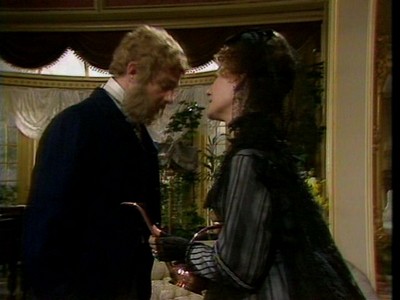
Madame Max (Barbara Murray) interposes watering can between herself and Fawn (Derek Jacobi) (Pallisers) (BBC 1974)
Madame Max. (Puts down can.) “The man I am due to interview will be here very shortly, my lord.” (now fixing papers on a table).
Fawn. “Oh, then the minute is even more precious. (His face has this crunchly-looking humility.) Madame Max, when I was last here, we were interrupted. I was going to tell you …”
Madame Max picks up her can as defense and barrier. “You have already told me, my lord, that if we saw more of each other, we should get to know each other better, and I have already told you there will be no opportunity for this. Now surely I made myself understood.”
Fawn. (taking the wet can and putting it down down to the side, grimaces on her face.) “Madame Max, Marie.”
She faces us and closes her eyes in a gesture which shows her disliking what is to come and trying to be patient.
Fawn. “I am a mature man of a certain rank and with a certain stainding in the world of politicks, but what I need now is to be settled.”
Madame Max. (hand and face now open) “As I understand it, Lord Fawn, you are going to be settled with Lady Eustace.”
Fawn. (sudden strength in his face and arrogance of posture in his body). “Lady Eustace has been found … unworthy. Whatever engagement I entered into with her has been rendered void by her disgrace.”
Madame Max. (expansive gesture). “What disgrace,my Lord … of what would she be … would she be sent to jail? would she be arrested or …”
Fawn. “That would depend upon the police, but there is no doubt that they suspect her of grossly misleading them.”
Madame Max. “Ah! but no charges have been made against her. Surely your place is by her side until her guilt is proved. You must be the loyal cavalier to this maiden in distress.” (the use of this anachronistic term couples Lizzie with Mary who was indeed “maiden in distress”—so sex is in a sense discounted, there are worse dishonors, far worse, this buried theme is deflected by a joke.)
Fawn. “Lady Eustace is hardly a maiden.”
Madame Max. (funny) “Matron then.”
Fawn. “And I think I can fairly claim that she herself as released me (he moves into pleading posture) I am free to plead my cause with you.”
Madame Max. (begins to move towards the piano while they remain in semi-close up.) “Lord Fawn … ”
Fawn. “Oh, Frederick, call me Frederick and take this hand (down on his knees as in first scene) and let me tell you that all will come with it. First my ... (puts hand on his heart awkwardly) my heart …”
Madame Max. “And after your heart, Lord Fawn …”
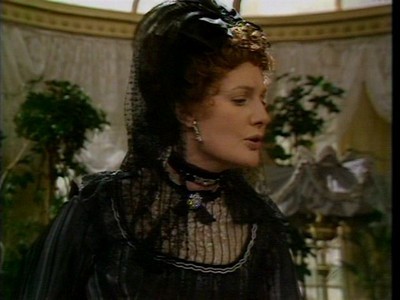
Madame Max hears negotiations in Fawn’s words
Fawn. (gets up because she is allowing a real opening and negotiation has begun) “My house.”
Madame Max. “Ah! (turns round and laughs). “Fawn Court.” “It is, I trust, unencumbered?”
Fawn. “Uh … well … there is a small mortgage.”
Madame Max. “Oh! Oh! (groaning mockery) “What a pity! And after your heart and your small mortgage, Lord Fawn?”
Fawn. “My coronet!” (strong tone).
Madame Max. “Oh! you have your own?” (now walks round the piano, laughs) “Most peers nowadays it seems hire one when necessary.”
Fawn. (laughs but not in the same lightly mocking way) “Oh no I was thinking figuratively. You see what I meant was that you would be Lady Fawn of Fawn Court and all that it contains.”
Madame Max. “Among other things your mother and seven unmarried sisters.”
Fawn. “Oh so you’re heard about them?”
Madame Max. “Oh, my dear Lord Fawn, you surely were not going to conceal them from me. And pray, Lord Fawn, what comes after your eight female connections? A place as ninth muse in the chorus?” (this is a transposition from the book, it’s a brilliant inference from the way Fawn treated Lucy Morris, who was the woman who refused to be a ninth muse in a submissive adoring chorus)
Fawn. “A place in political circles.” (This temptation Lady Laura could not withstand, and the role now solaces Lady Glen). “You shall be the hostess of my entertainments when we liberals are back in power.”
Madame Max. “Entertainments!” (he looks hopefully into her face). “Never have I heard you gave entertainments whether in or out of power and very prudent enough Lord Fawn. (Goes to pull bell.) “No entertainments until you have saved up enough money to buy yourself a coronet and one for your wife whomever she may turn out to be.”
Fawn. “Oh, but if it were you it would be enough and to spare for coronets and entertainments”
And so we hear the real motive of his coming here and now Madame Max’s laughter rings more good-naturedly.
bq. Madame Max (close-up to her face). (He laughs hesitantly and then stands there embarrassed but trying hard) “Oh, lord Fawn, that at least is frank,and brings me close to liking you than I have been so far this afternoon.”
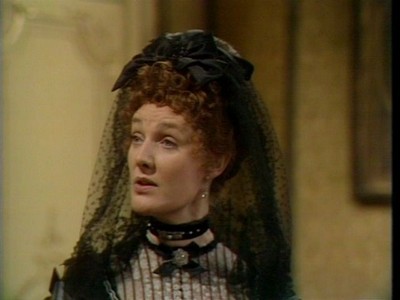
Fawn (close up to his face as we hear her words).
Madame Max. “But no my Lord.”
[Man servant comes in with cane and hat as we have seen him come in to Dolly and Barrington Erle early in series, and Phineas a little later when Madame Max expecting the Duke (when he was pestering her to be his mistress).
Marie. “I do not wish to purchase a coronet either in the literal sense or in the figurative.” (she brings him his hat and cane as she once did Phineas.)
Fawn. “And that is final?”
Marie. “Final.”
Fawn nods (relief is slightly seen). “Ah! (takes his things.) “Well oh I shouldn’t have troubled you, I suppose, I never was a hand at ths sort of thing. It always goes wrong when I try it.” (We or I felt pity for his honesty and the pulling aside of veils suggesting how easy it is to be a macho male and layering over macho aggressions with glamor)
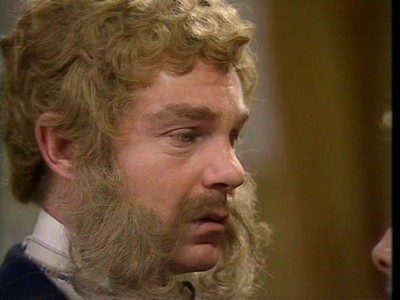
Fawn showing open vulnerability
Madame Max (using him out gently while standing confidentially near). “Perhaps you need more practice. You know your style is far from elegant.”
Fawn. “But you talk as if it were all like cricket or fencing or something.”
Madame Max. “More like fishing, my lord. You first tempt your quarry with you own worm [this is a reference to his phallic part which has not at all been firm in this scene] before you impale her on your hook.
He gets the pun and reference and slowly looks hurt.
But we forgive her for this because he was the hypocritical aggressor; she tried to spare him with her watering can, and visually when he leaves she shuts the door and stands there breathing relief. This kind of moment, the woman standing on the other side of shut door in intense relief and in her face things she would rather forget is a trope of these mini-series with heroines at the center. Her final words include an insulting sexual pun which recalls 1:1 where Raven had a young Plantagenet and Lady Grisela talking about decimal coinage in terms that equated its success with an imagined orgasm in sex they never get to have.
The brilliancy of the scene is in the punning, undercurrents of scorn, and the bargaining phase where Madame Max gets him to drop the talk of love and start to talk business. And it emerges he has not enough to offer for what she will have to endure.. The larger issues are Trollopian: the marriage for money, the necessity and humiliation of males asking; in Trollope the idea they have the right to ask and the woman must find some reason to refuse. And it’s modern too: the scene delights us for debunking the titled cock male. And we have the fantasy of the European non-ambitious femme fatale (which I outlined some time ago) triumphing by saying no. It’s glorious—and puts me in mind of how much fun it is for us to watch Elizabeth Bennet refuse the prize Darcy too.
Next blog: Lord George shuts the door on Lizzie Eustace, and we have a resurgence of the basic conflict in personality and point of view between the two Pallisers. In the scene between George and Lizzie, we see how she does not grasp that romancing a man into a all-powerful protective glamor hero whose behavior is the equivalent of a mother is not something which allures men; the Pallisers enact a scene many a modern woman may have experienced when she attempted to get her husband to involve himself in her household life, her activities, and their children’s intimate daily life.
Ellen
See various links and a concise summary of 1:1-3:6, 4:7, 4:8, 5:9, 5:10, 6:11, 6:12, and 7:13.
--
Posted by: Ellen
* * *
Comment
- Summary: Lizzie matter 8
Scene 1: Lizzie matter (Fawn and Clara) (begins episode 26, rejection)
Scene 4: Frank rejects Lizzie
Scene 5 Clara sends Fawn forth
Scene 6: Madame Max and Fawn (climactic scene, longish)
Scene 7: George deserts (important, she loses last possibility of half-decent man) (begins episode 27, George leaves)
Scene 9: Police confront Lizzie and she is told she is outcast, good and important scene, longish (begins episode 28, outcast)
Scene 12: Hartfield front room, clash of Lizzie and Jane, and then last adieu of Jane and George
Scene 14: Hartfield front room, Lizzie and Emlius, important scene anticipating how she will be treated by him once they marry, sheer sex object and money machine; he will use her as she wishes to use others (episode 30, trouble brewing)
Phineas matter: 4
Scene 2: Matching Priory: Madame Max, Lady Glen, Duke: but this one is about Phineas Finn, situating him, married expecting to be a father
Scene 3: Death of Mary Finn
Scene 10: Matching Priory, Duke, Madame Max, Lady Glen, Palliser: this is about return of Finn, where he’s standing
Scene 11: Gentleman’s club, immediately begins his trouble with Bonteen, and issue of disestablishment, remark about Bonteen braying (episode 29, Finn’s return, in book not brought up until Finn at Tankerville and then foisted on hiim by others)
Palliser matter 1
Scene 8: Bungay, Duke, Palliser and then Palliser and Lady Glen (picks up matter from across series again, referring back to origination of marriage, anticipates Prime Minister)
Phineas and Palliser matter combine: 3
Sceen 13: Lady Glen with book for child, to her Phineas, Pallisers welcome him, she leaves for child and we get him v Madame Max. Quite different from way they naturally get together in book, really combines some Palliser matter
Scene 15: a salon scene: Palliser story and Phineas combine Bungay and Lady Glen as chorus, Palliser confronts Finn, another set to with Bonteen, remark about how paupers not so hard to deal with, not so malicious
Scene 16: the club, Phineas now consults Barrington about Kennedy’s letter and Laura matter brought back
— Elinor Sep 1, 6:48am # - By Nick Hay:
“I am again following Ellen who wrote: ‘I offer the idea that the material of this middle novel [Eustace Diamonds] was actually less susceptible to conventional normalization on the terms the other five sets of stories were, and instead of rising to a challenge, the team focus is on a misogynistic typing which invited the viewer to laugh at bullying, an icon of emasculated or unmacho maleness, and the old joke of the “dirty old man.”’
Nick’s reply:
“Indeed I would go slightly further in one respect – I did not enjoy the scene between Madame Max and Fawn ; to me this felt as if Raven (or whoever) were attempting a Wildean comedy of manners. Now there is nothing wrong with this as such, even if it is not a favourite form of mine – the problem is that I always feel Wilde does it better, and we do have very direct visual comparisons (that is through the plays and the many screen ‘adaptations’ – I use the inverted commas deliberately because filmic adaptations of drama seem to me quite different from those of novels due to the partially visual nature of the originals, but that is too wide a matter).”
— Elinor Sep 2, 12:53pm #
commenting closed for this article
